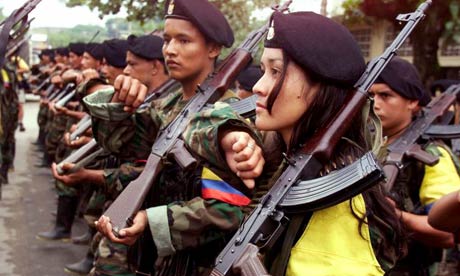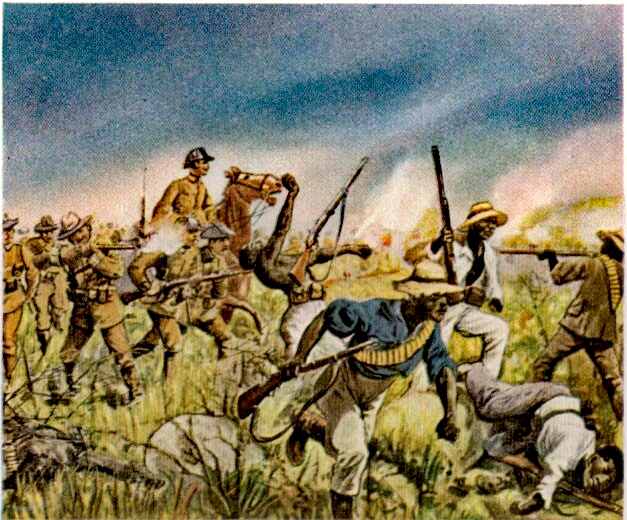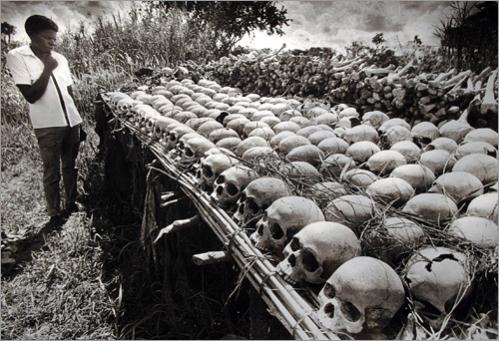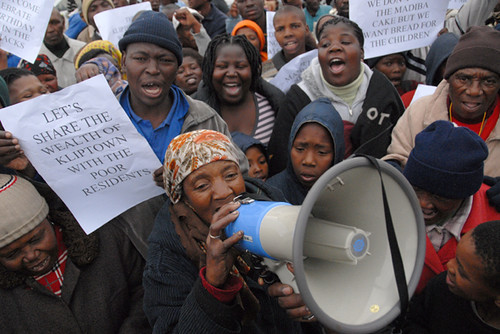history
Sudan: Mohamed Ibrahim Nugud's ideas will live on
Colombia: The end for guerrilla warfare?

FARC guerillas.
[For more discussion on Colombia, click HERE.]
By Anthony Boynton, Bogotá, Colombia
March 25, 2012 – Links International Journal of Socialist Renewal -- As long as there are sleepy, oppressed, oppressive and isolated villages connected to a city somewhere over the hill by an unpaved road with bridges that might wash out in the next storm, guerrilla warfare will be possible. But those villages are fast disappearing into memory as the extension of electric grids and networks of paved roads extend into every corner of what used to be called the Third World.
The contradictions of Ronnie Kasrils: The leftist spy who came in from cold Pretoria

Ronnie Kasrils speaks out against Israel's apartheid policies, March 5

German troops kill the Herero, circa 1904. Painting by Richard Knötel (1857-1914).
Africa's Pambazuka News has devoted an entire issue to Germany's 1904-08 genocide of the Nama and Herero peoples (in Namibia). Below Links International Journal of Socialist Renewal posts the editorial and an article that details this shameful imperialist slaughter and modern Germany's refusal to adequately acknowledge and compensate Namibia for its crimes. Read the full issue HERE. Become a Friend of Pambazuka.]
* * *
By Eric Van Grasdorff, Nicolai Röschert and Firoze Manji
March 20, 2012 -- Pambazuka News -- On March 22, 2012, Germany's parliament will debate a motion to acknowledge its brutal 1904-08 genocide of the Nama and Herero peoples. Germany’s refusal thus far, and its less than even ‘diplomatic’ treatment in 2011 of the Namibian delegation at the first-ever return of the mortal remains of genocide victims, demands a reassessment of suppressed colonial histories and racism.
Uganda: How the West brought Idi Amin to power

Some of the victims of the Idi Amin regime recovered by local farmers in the fertile fields of the Luwero Triangle region
Cuba's alternative to privatisation
[For more analysis and discussion on the changes in Cuba, click HERE.]
By Marce Cameron
March 11, 2012 -- Green Left Weekly/Links International Journal of Socialist Renewal -- Cuban President Raul Castro has urged the Caribbean nation's citizens to contribute to a free and frank debate on the future of Cuba’s socialist project.
For the Cuban Communist Party (PCC), the aim of this debate is twofold: to strive for consensus on a new Cuban model of socialist development and to empower Cuba’s working people to implement what has been decided.
In other words, to advance a socialist renewal process in the face of entrenched opposition from within the administrative apparatus.
It is first and foremost a debate about the economy. A draft policy document, the Economic and Social Policy Guidelines, was submitted to a national debate for three months before to its adoption by the Sixth PCC Congress in April last year.
The core principles and objectives of the draft were conserved, but the final version of the Guidelines was substantially modified on the basis of this public debate.

[For more discussion on China's economic and political development, click HERE.]
By Kevin Lin
March 11, 2012 -- Green Left Weekly/Links International Journal of Socialist Renewal -- Rural protests make up a large part of overall social unrest in China. But such protests had not received prominent international attention until the siege of Wukan, a village of 12,000 in Guangdong province, late last year.
Just like the strikes in Honda plants in 2010, Wukan brought to light the deep-seated grievances of villagers in a dramatic way. The revolt featured the eviction of party officials and the police, the self-management of the village by villagers, and the stand-off against armed police in a siege for more than a week.
The Wukan protest was triggered by the local government's land expropriation without adequate compensation to the affected villagers. It was escalated by the death of a protest leader in police custody.
The villagers showed remarkable courage in occupying their own village against predictable state repression.
The class nature of the Chinese state
By Doug Lorimer
[The general line of this report was adopted by the 18th DSP Congress, January 5-10, 1999. This text is taken from The Activist, volume 9, number 1, 1999.]
The purpose of this report is to motivate the adoption by the party of the "Theses on the Class Nature of the People's Republic of China" approved by the National Committee at its October plenum last year.
Since 1993 our party has held the position that the ruling Chinese bureaucracy has been presiding over the restoration of capitalism in China. However, our policy toward China has been ambigious: while taking an oppositional stance in our public press toward the ruling bureaucracy's restorationist course, we have left it unclear as to whether we continued to believe that China is still a bureaucratically ruled socialist state.
Lenin: 'democratic, socialist and revolutionary'
March 1, 2012 – Links International Journal of Socialist Renewal – Fifty key figures on the left including Ian Angus,
'Uneven and combined Marxism' within South Africa’s urban social movements

A protest by Kliptown Concerned Residents and the Anti Privatisation Forum.
Lars Lih: Falling out over a Cliff

Click HERE to follow the entire debate on Tony Cliff's Lenin. For more discussion on revolutionary organisation, click HERE.More articles by Lars Lih are available at http://links.org.au/taxonomy/term/500.
* * *
Remarks on the 1905 Congress and the 1912 conference of the Russian Social Democratic Worker Party (RSDWP)
By Lars T. Lih
The collapse of 'communism' in the USSR: Its causes and significance
By Doug Lorimer
Doug Lorimer is a member of the National Executive of the DSP. This article is based on a report adopted by the 14th National Conference of the DSP, held in Sydney, January 2-6, 1992.
©Resistance Books 1997; first published 1992, second (revised) edition 1997
Contents